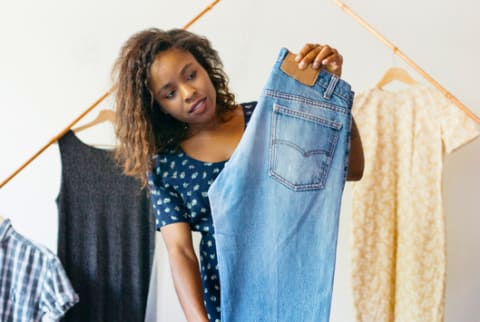Advertisement

As a board member of the Organic Trade Association, Textile Exchange, and Fashion Revolution, I've learned that people will make more mindful choices if you appeal to them at a visceral level—in food, it's all about taste; in personal care, it's about scent and functionality; in fashion, it's style.
The good news? After working in this industry for two decades, I'm happy to share that 80 percent of consumers in the United States are now buying organic products at least occasionally.
Yet, while perceptions of clean, conscious products have evolved over the years, certain misconceptions still linger:
1. You have to sacrifice something to shop sustainably.
Eco-friendly used to be seen as a sacrifice, whether that meant boring, flavorless food or frumpy clothing. But these days, it's not about either/or—it's about both/and. Looking and feeling fabulous should never come at the expense of personal or planetary health. This mentality is being embraced more and more—as green food, fashion, and beauty are now seen as the height of comfort, quality, and elegance. The rise of eco-luxury travel and sustainable high fashion (looking at you, Stella McCartney) are two wonderful examples.
2. Sustainability is for the elite.
A common misconception about organic fashion, food, or beauty is the assumption that it comes with a much higher price tag. But this can come from the inefficiencies of current business models and not inherently higher costs of sustainable production. In food, farm-to-table concepts can be a win-win-win for farmers, businesses, and consumers alike. In apparel, supply chains can have between seven and 10 different factories in the mix, which can mean a markup in price each step of the way from the raw material level. When companies work directly with the source—from farm to finished product—they can actually eliminate many added costs, offering added value at competitive prices.

Take food, for example: Online retailers like Thrive Market offer competitive prices by eliminating storefronts. And plant-based meal delivery service Purple Carrot ensures vegetarian and other plant-based eaters the same convenience of conventional meal delivery. Even national fast-food chains like Chipotle, Veggie Grill, Le Pain Quotidien, Panera, and Au Bon Pain are rethinking their menus as more and more individuals consider eating organic, sustainably farmed, plant-based, dairy-free, gluten-free, etc.
3. We can't trust green claims.
In the early days of conscious consumerism, this was more of a concern. Now, there is labeling for food and fashion to help us avoid supporting companies with unsustainable or exploitative business practices. For food, there's USDA-certified organic and non-GMO. As far as fashion is concerned, keep an eye out for GOTS (the platinum organic standard), Fair Trade Certified, OEKO-TEX, and Cradle to Cradle Certified apparel and home products.
Perhaps 10 years ago, some of these beliefs had some credence, but today, we can have the quality, style, flavor, and price we want, plus so much more. We have entered an age I call the "ECOrenaissance," marked by a shift in popular culture toward awakened living.
Here are some of my top tips for joining the revolution:
With food, get to the source and pay mind to waste.

Being a smart consumer is being a smart eater. Get in touch with the source of your food. Purchase directly from farmers markets and/or, if you're a gardener at heart, grow your own produce. You'll start to develop an intuitive understanding of the origins of food and the connection between human and planetary health.
There are so many simple things you can do to reduce waste, both in food and packaging. Buying groceries in bulk cuts down on packaging waste—and will likely save you money. And carry a Mason jar or reusable cup for your takeout coffee. Some coffee shops and restaurants even offer a discount if you do. When it comes to reducing food waste, consider buying "defective" or "ugly" products—produce that isn't perfectly shaped and shiny is often discarded.
With personal care, look to the wave of accessible companies boosting transparency.
Our skin is our largest organ and the primary organ for absorption—it's no wonder the beauty industry has done some revolutionary rethinking of their ingredients, independent of the FDA, which lags behind most developed countries on regulating toxic chemicals. Thanks to tools like the Environmental Working Group's Skin Deep database, we can look into the safety of most products out there.
It's now so easy to find holistic beauty and personal care products. Accessible natural beauty brands can be found online, but don't dismiss the drugstore either: CVS, Duane Reade, and Walgreens have all expanded their organic offerings in recent years. Even Target has pressured suppliers to clean up products and packaging.
Take fashion into your own hands.
People get that what we put in and on our skin matters. Fashion is a little harder to grasp. The industry’s long, complicated, and opaque supply chain makes it hard for consumers to see the impacts of their clothes. From the toxic chemicals used in dyeing and treating textiles to pollution, climate change, and forced labor, changing the way we dress is not an option; it's an imperative.
There are so many fun, inexpensive ways to be a part of the fashion revolution. Get creative and use what you have—mend, restyle, rethink, and DIY. Check out resources like The Renewal Workshop and The RealReal for inspiration. If you're looking to add to your wardrobe, shop vintage or secondhand first, or set up a clothing swap with friends.
For specific occasions and one-time wears, consider renting from places like Rent the Runway. Even if you're not thrifting, swapping, or renting, there are so many avenues to find sustainable, ethical apparel. Download the free Good On You app, which rates apparel brands.
Being a thoughtful consumer does not have to break your wallet. It's not about giving anything up—including affordability, accessibility, or authenticity—it's about getting more. Solving today's problems through positive business is the name of the game, and enlightened consumers like you can be part of the solution.
Check out why this renowned designer thinks the fashion industry needs a spiritual revolution.
Watch Next
Enjoy some of our favorite clips from classes
Enjoy some of our favorite clips from classes
What Is Meditation?
Mindfulness/Spirituality | Light Watkins
Box Breathing
Mindfulness/Spirituality | Gwen Dittmar
What Breathwork Can Address
Mindfulness/Spirituality | Gwen Dittmar
The 8 Limbs of Yoga - What is Asana?
Yoga | Caley Alyssa
Two Standing Postures to Open Up Tight Hips
Yoga | Caley Alyssa
How Plants Can Optimize Athletic Performance
Nutrition | Rich Roll
What to Eat Before a Workout
Nutrition | Rich Roll
How Ayurveda Helps Us Navigate Modern Life
Nutrition | Sahara Rose
Messages About Love & Relationships
Love & Relationships | Esther Perel
Love Languages
Love & Relationships | Esther Perel












